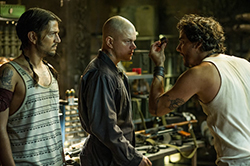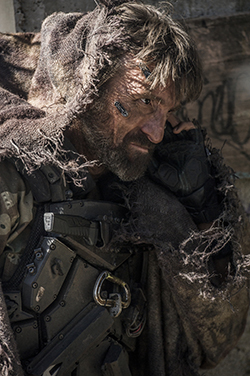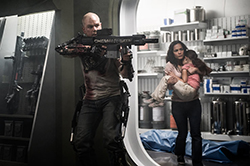Whether or not you'll like Elysium is almost totally determined by whether you liked director Neil Blomkamp's debut film District 9, because it and Elysium are about as related as two films can be. Both feature men caught up in situations much bigger than themselves, both plots are intensely allegorical, and both are at times heavy-handed in a way that scares off and repels some critics.
While District 9 paired modern times with an alien twist, Elysium moves all the action 150 years from today, sans aliens, into an overpopulated and dilapidated Los Angeles. Matt Damon's Max works as a reformed ex-con in a sort of dystopian factory, manufacturing the very police drones that are comfortable with breaking his arm on the way to work. However, after managerial carelessness results in Damon receiving a lethal dose of radiation, Damon has only five days to reach the ultra-rich space station/lifeboat Elysium, which floats in the earth's atmosphere like another moon and harbors the terraphobic rich of 2154.

Elysium has none of District 9's multivalence, and that has prompted critics to castigate Blomkamp for a preachiness that was really there all along. Maybe Blomkamp's smartest move in District 9 was using the alien Prawns as a metaphorical double whammy. They represented both the struggles caused by apartheid in the past and the modern-day struggles over immigration.
Because of this, Blomkamp made no ideological enemies; people who enjoyed his stance on immigration chose that metaphor, and even if you thought countries should all have the closed-est of borders, well, no one thinks apartheid was a good thing. The even allegorical sell didn't alienate any potential viewers.
But now, releasing a film whose MacGuffin is a medical pod that heals any wound, in our cultural context—Obamacare, Medicare, discussion as to whether or not a society should provide at all for "the least of these," and if the answer is yes, how much and in what way—shows a boldness that wasn't present in District 9.
Most criticism of the movie has been directed at the heavy-handedness of the message, a feature of Blomkamp's work that forms its only continuity with the gee-whiz Gene Roddenburyesque sci-fi of yesteryear. Sci-fi has, at its core, always been allegorical and preachy: writers basically fashioning ad absurdum arguments in narrative form. (Sci-fi's closest formal cousin isn't fantasy, which generally is escapist in aim. It's satire, which also holds a mirror to society, but whose funhouse mirror is made out of comedy rather than technology and the passage of time.)
The movie is far from perfect. Sharlto Copley is almost a too-easy antagonist (a trait he shares with District 9's Jason Cope), Alice Braga's character is underdeveloped, the end is too convenient and preachy—but I feel that those complaints miss something staggeringly important about Elysium. The problem is just that Blomkamp likes to make his movies look like they're about the things they're not about, which is confusing, because I don't think Elysium is primarily "about" healthcare or inequality at all, any more than Apocalypse Now is "about" Vietnam.

Elysium is about a young boy growing into an understanding of where he belongs in a big scary world that he doesn't understand. The movie's prologue and epilogue actually make this point almost agonizingly clear: the movie is almost not about the effect Damon will have, but what it will mean for him as a character.
Blomkamp did the exact same thing in District 9 with Copley's Wikius: with or without his actions, the ending would have happened, just in a slightly different way and slightly faster. Elysium is not quite as deterministic as District 9 (in which Copley's mission is to solve a problem that he himself caused), but it still operates around one man trying to find his identity in the midst of huge systemic upheaval.
If anything, District 9 and Elysium are fraternal twins, sharing concerns of systemic injustice and "worlds colliding" and people exploding into red paste. But they also—I think most importantly—share a very specific view of their heroes, because Blomkamp seems less concerned with Copley and Damon's function as Plot Motivators, more interested in exploring their moral nature, like their capacity for fear, cowardice, regret, and, ultimately, heroism.
In both District 9 and Elysium, Copley and Damon's characters have opportunities to try and persevere through hardship, to take the "heroic" route through, to make their own way. And in both films, the hero turns it down in favor of what's easier.
In what is perhaps District 9's best scene, the supposed "hero" is equipped with space-age battle armor, and has the opportunity to free his alien companion. But Copley turns to his captors and shouts: "You have the prawn! You have what you want. Just let me go," and then runs in the opposite direction.
That's profoundly unheroic behavior, the kind of thing that we'd barely tolerate from a hero in the opening pre-reformatory glimpses of a protagonist, let alone in the third act. But Blomkamp's heroes, well, aren't—aren't self-consciously heroes, that is. They are just people, caught up in events too big for them to comprehend, even though they've been given enough power to manipulate them at will.
Both films star protagonists who've been granted more power than they know what to do with, and in both, they fail. In a superhero origin story, the protagonist usually "fails to be strong enough," but that's not what's going on here. These "heroes" have a choice between selfishness and selflessness, and they choose to be selfish, because they're scared, and don't understand, and don't care about politics and struggles, and just want to be safe. This makes Blomkamp's heroes at once kind of unlikable and uniquely human, certainly within the realms of the summer blockbuster.
Elysium's opening has a nun explain to Max-as-child that he's destined to do great things for earth, but the movie's message seems to directly contradict that sentiment at every turn—Damon isn't destined for anything, but will get exactly what he chooses. His decision to rely on the easier-but-selfish solution to his problems (as well as ignoring pleas for help from others) has direct consequences for him. But it's never unfathomable why he'd make that mistake in the first place. In fact, it could hardly even be called a mistake—just selfishness, just moral failure.
That's not the end, though. In District 9, Copley doesn't leave his alien compadre to his doom, and Elysium's Damon accepts his failure and learns from it. And that's incredibly important, because most movies take one of two ways when it comes to the idea of right and wrong.

They may promote a concrete sense of right and wrong, in which the heroes are never wrong in a substantial way. So someone may be a poor father at the beginning of the film, but will never make grievous moral errors that would make us think they're bad. That way we know that there's morality, and that our heroes are on the right side of it.
Or, the movie might disregard the idea of things being right or wrong. That means it doesn't matter what the protagonists do, because they're as justified as they can be by pursuing self-interest. In these stories, good is what our "heroes" want, and bad is what our heroes' enemies want.
But in both of these treatments of right and wrong, the heroes are morally immaculate, either by virtue of correctly following prescribed moral guidelines, or by ignoring their existence entirely. They kind of have to be, for us to stick with them.
Blomkamp's heroes exist in the murky middle ground of the two—which is, incidentally, where everyone reading/writing/ignoring this article lives as well. Elysium and District 9 feature right and wrong, but also show their heroes being human and messing up in big, ugly, complicated ways.
But unlike some other films, which seem to exist to degrade our morality structures (and thus I guess impress us with their faux-edginess and coolness), Blomkamp's movies suggest that our heroes can make amends. Their morality isn't pre-established, but is actually a function of what they choose to do. Their choices matter.
This is similar to my favorite thing about AMC's Breaking Bad, and I think there's no coincidence there. It's not that all media should follow one prescribed pattern—just that both Breaking Bad and Blomkamp's films touch on something really important about how we're responsible for our own moral choices. It's a massively unpopular message that also touches the heart of what it means to be a human being. (It's my guess that a life spent somewhere like South Africa helped render Blomkamp immune to the kind of hyper-sterilized feel-good moral universalism that permeates most of our movies today).
So whatever problems the movie has—and there are many—I don't care about them that much. I care about Max, and what happens, and what he learns, because he's interesting, because he's a flawed person, like me. And I'm willing to tolerate some heavy-handedness to get to that. That's interesting and valuable, especially for a big-budget Hollywood flick. And it's strange to me that I had to go 150 years into the future to see one of the most human endeavors I've seen on the big screen this summer.
Caveat Spectator
Exploding people, common and unflinching gore, a blasted-off face shown in high detail, shootings, stabbings, frequent uses of f- and s-words, a sociopathic character who is purported to rape and murder people and is violent towards a woman, and more blood than the finale of Reservoir Dogs make Elysium a movie for only adults and mature teens. A tense scene shows Damon undergoing surgery. Convoy space ships full of immigrants to Elysium (originally wrote "innocent illegal immigrants" but realized that most readers wouldn't take kindly to the claim) are blown up by the authorities in Elysium, trying to keep their ship free of intruders.
Jackson Cuidon is a writer in New York City. He enjoys movies with explosions and music with loud guitars.











